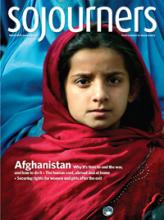Enuma Okoro grew up in four countries, including Nigeria and the Ivory Coast, and describes her religious education as "doses of Roman Catholicism washed down with long gulps of multiflavored Protestant theology." Perhaps because of this broad personal experience, Okoro has a down-to-earth, generous perspective on churches, worship, tradition, and the sometimes circuitous path to spiritual community. A former director of the Center for Theological Writing at Duke University, Okoro is the author of Reluctant Pilgrim: A Moody, Somewhat Self-Indulgent Introvert’s Search for Spiritual Community (Fresh Air Books) and co-author of Common Prayer: A Liturgy for Ordinary Radicals (Zondervan). Sojourners editorial assistant Betsy Shirley spoke with Okoro in December.
Betsy Shirley: In your memoir, Reluctant Pilgrim, you write about your experiences in different churches and about your struggle to find spiritual community. How have these experiences changed your understanding of liturgy?
Enuma Okoro: Liturgy really is the work of the people—that’s the direct translation. At this stage of my life, I’m more aware that we get the most out of liturgy when we fully participate in it ourselves and recognize ourselves as a necessary part of it. The ways in which we’re transformed by liturgy is all grace, but we need to be active participants for that transformation to happen. So I’ve come to a deeper understanding of what it means to bring all of one’s self to liturgical practices.
Read the Full Article
